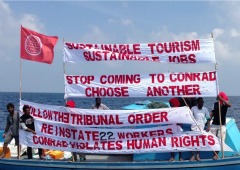The Maldives government has ratified eight “fundamental” International Labour Organisation (ILO) conventions designed to bring legislation on employee rights and trade unions in line with international standards.
According to the ILO the conventions, which were ratified by authorities on January 4 this year, outline rights in a number of areas including allowing staff freedom of association and the prevention of child labour and discrimination on the basis of gender, religion, race or age.
The ratification of the conventions comes as foreign governments and civil society organisations continue to raise concerns about rights abuses of expatriate workers in the Maldives.
Foreign labourers are estimated to account for a significant proportion of the country’s workforce. Just over a quarter of the Maldives population of 394,451 people is estimated to be made up of foreign workers, according to recent statistics supplied by the Department of Immigration and Emigration.
The official immigration figures found that the expatriate workforce in the Maldives had risen by September 2011 to 99,369 people from just 57,968 registered workers in December 2009.
According to the local coordination team overseeing the ILO’s work in the Maldives, many of the rights outlined in the eight fundamental conventions are already included in the country’s constitution and the Employment Act 2008.
However, the project’s organisers told Minivan News this week that its main challenge was to try and implement these laws by working with the government as well as employer and employee organisations.
“Ratification of the conventions will be beneficial to workers and workers organisations as it will improve the national labour standards concerning the freedom of association and collective bargaining rights and also help ensure better implementation of these standards in practice,” a project coordinator for the ILO told Minivan News.
“Respect for freedom of association and collective bargaining rights can lead to better labour management relations and co-operation between them. This will reduce costly labour-management conflicts and promote industrial harmony and social stability.”
The eight fundamental conventions ratified by the Maldivian government this month are:
- The Forced Labour Convention, 1930 (No. 29)
- The Abolition of Forced Labour Convention, 1957 (No. 105)
- The Freedom of Association and Protection of the Right to Organise Convention, 1948 (No. 87)
- The Right to Organise and Collective Bargaining Convention, 1949 (No. 98)
- The Equal Remuneration Convention, 1951 (No. 100)
- The Discrimination (Employment and Occupation) Convention, 1958 (No. 111),
- The Minimum Age Convention, 1973 (No. 138),
- The Worst Forms of Child Labour Convention, 1999 (No. 182)
With the ratification of these conventions, which will come into effect in a year’s time, the ILO project’s coordinators have set three main objectives that it will aim to meet over the course of the next three years.
These objectives include introducing a legal framework to implement international labour standards, improving the capacity of national mechanisms to resolve labour disputes and strengthen worker and employer organisations to try to improve overall working conditions and productivity.
In a statement released following the ratification of the conventions, Minister of Foreign Affairs Dr Samad Abdullah praised the government’s ratification of the conventions as a “major achievement” for the present administration.
Dr Samad cliamed that the conventions would allow the country to break new ground in protecting labour rights in the country.
“It is also an important accomplishment in the government’s human rights agenda and one which will fill an existing gap in the national human rights framework,” he stated.
According to the ILO, the Maldives has become the fourth country to ratify all eight of the organisation’s fundamental conventions in the South Asia region. The Maldives became a member of the ILO back in 2009.
Beyond signing the convention on labour rights, the Ministry of Foreign Affairs this month also inaugurated an initiative targeted at raising awareness of the human trafficking issue in the Maldives.
The strategy, entitled ‘Blue Ribbon Campaign Against Human Trafficking’ is expected to include activities to try and raise awareness among students and the business community.
Rights concerns
Both these commitments have been agreed as the Maldives has come under continued criticism for its treatment of foreign workers.
Indian authorities by the end of last year warned that tightened restrictions enforced at the time on providing medical visas to Maldivians were a “signal” to the country’s authorities to address a number of concerns about the nation’s treatment of migrant workers.
A commission spokesperson expressed concerns over a number of practices being used by both public and private employers in the Maldives such as the confiscation of passports of some migrant workers.
Meanwhile, back in November, the Human Rights Commission of Maldives (HRCM) called for an end to discrimination against foreign workers, criticising Maldivian society for failing to recognise “the significant contribution” expatriates have made to national development.
However, concerns about worker treatment in the country are not exclusively focused on migrant workers.
A letter from the President’s Office claiming to have addressed alleged rights abuses by the state-owned Maldives Ports Limited (MPL) had been labelled “interesting, but not convincing” by the International Transport Workers’ Federation (ITF) last November.
The ITF previously raised concern over a lack of correspondence from the President’s Office, announcing the same month that it was calling on the government to intervene over “union intimidation”, or “face embarrassment wrought by widespread international solidarity action”.




